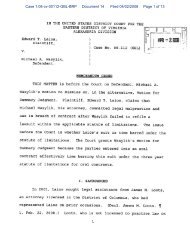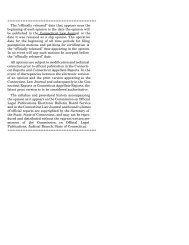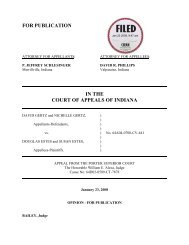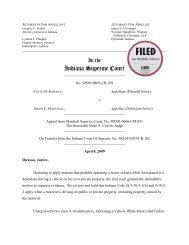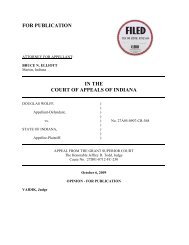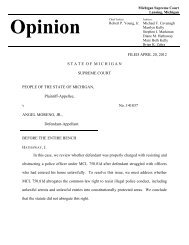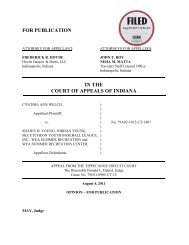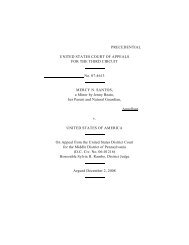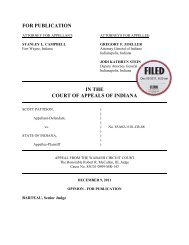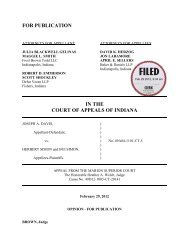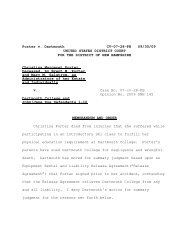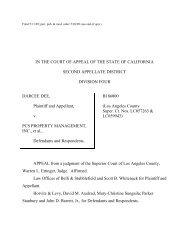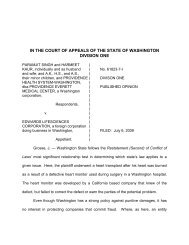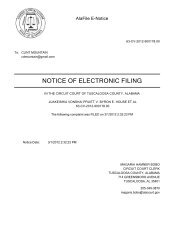Iota Xi Chapter of Sigma Chi Fraternity v. Patterson - Lawyers USA ...
Iota Xi Chapter of Sigma Chi Fraternity v. Patterson - Lawyers USA ...
Iota Xi Chapter of Sigma Chi Fraternity v. Patterson - Lawyers USA ...
Create successful ePaper yourself
Turn your PDF publications into a flip-book with our unique Google optimized e-Paper software.
PUBLISHED<br />
UNITED STATES COURT OF APPEALS<br />
FOR THE FOURTH CIRCUIT<br />
IOTA XI CHAPTER OF SIGMA CHI<br />
FRATERNITY, George Mason<br />
University; RYAN DUCKWITZ,<br />
Consul, <strong>Iota</strong> <strong>Xi</strong> <strong>Chapter</strong> <strong>of</strong> <strong>Sigma</strong><br />
<strong>Chi</strong> <strong>Fraternity</strong>; JUSTIN PIETRO, Pro<br />
Consul, <strong>Iota</strong> <strong>Xi</strong> <strong>Chapter</strong> <strong>of</strong> <strong>Sigma</strong><br />
<strong>Chi</strong> <strong>Fraternity</strong>,<br />
Plaintiffs-Appellants,<br />
v.<br />
PAMELA PATTERSON, Associate<br />
Dean <strong>of</strong> Students, individually and<br />
in her <strong>of</strong>ficial capacity; MICHELE<br />
GOUBADIA, Associate Director for<br />
Student Activities, Greek Life, No. 08-1417<br />
individually and in her <strong>of</strong>ficial<br />
capacity; GIRARD MULHERIN, Dean<br />
<strong>of</strong> Students, individually and in<br />
his <strong>of</strong>ficial capacity; SANDY<br />
HUBLER, Vice President <strong>of</strong><br />
University Life, individually and<br />
in her <strong>of</strong>ficial capacity; ALAN G.<br />
MERTEN, President, individually<br />
and in his <strong>of</strong>ficial capacity,<br />
Defendants-Appellees,<br />
and<br />
GEORGE MASON UNIVERSITY,<br />
Defendant.
2 IOTA XI v. PATTERSON<br />
Appeal from the United States District Court<br />
for the Eastern District <strong>of</strong> Virginia, at Alexandria.<br />
Leonie M. Brinkema, District Judge.<br />
(1:07-cv-00883-LMB-TCB)<br />
Argued: January 27, 2009<br />
Decided: May 13, 2009<br />
Before MOTZ, KING, and DUNCAN, Circuit Judges.<br />
Affirmed by published opinion. Judge King wrote the opinion,<br />
in which Judge Motz and Judge Duncan joined.<br />
COUNSEL<br />
ARGUED: Christopher Aldo Porco, THE LAW OFFICES<br />
OF CHRISTOPHER ALDO PORCO, P.L.L.C., Washington,<br />
D.C., for Appellants. Stephen R. McCullough, OFFICE OF<br />
THE ATTORNEY GENERAL OF VIRGINIA, Richmond,<br />
Virginia, for Appellees. ON BRIEF: William C. Tucker,<br />
BUTLER, WILLIAMS & SKILLING, P.C., Richmond, Virginia,<br />
for Appellants. Robert F. McDonnell, Attorney General<br />
<strong>of</strong> Virginia, William E. Thro, Special Counsel, William C.<br />
Mims, <strong>Chi</strong>ef Deputy Attorney General, David G. Drummey,<br />
Brian E. Walther, K. Anne Gambrill Gentry, Assistant Attorneys<br />
General, OFFICE OF THE ATTORNEY GENERAL OF<br />
VIRGINIA, Richmond, Virginia, for Appellees.
KING, Circuit Judge:<br />
IOTA XI v. PATTERSON<br />
OPINION<br />
The <strong>Iota</strong> <strong>Xi</strong> <strong>Chapter</strong> <strong>of</strong> <strong>Sigma</strong> <strong>Chi</strong> <strong>Fraternity</strong> (the "<strong>Chapter</strong>")<br />
and two <strong>of</strong> its <strong>of</strong>ficers, Ryan Duckwitz and Justin Pietro,<br />
sued George Mason University (the "University") and several<br />
<strong>of</strong> its administrators 1 in the Eastern District <strong>of</strong> Virginia, alleging,<br />
inter alia, constitutional claims under 42 U.S.C. § 1983.<br />
The <strong>Chapter</strong> and certain <strong>of</strong> its members were sanctioned by<br />
the University following their involvement in a series <strong>of</strong> disciplinary<br />
incidents, and the plaintiffs allege that those sanctions<br />
deprived the <strong>Chapter</strong> and its members <strong>of</strong> their procedural due<br />
process and free speech rights. The district court awarded<br />
summary judgment to the defendants, see <strong>Iota</strong> <strong>Xi</strong> <strong>Chapter</strong> <strong>of</strong><br />
the <strong>Sigma</strong> <strong>Chi</strong> <strong>Fraternity</strong> v. <strong>Patterson</strong>, 538 F. Supp. 2d 915<br />
(E.D. Va. 2008), and this appeal followed. As explained<br />
below, we affirm.<br />
I.<br />
A.<br />
1.<br />
The University is a public institution located in Fairfax<br />
County, Virginia, where, until May 8, 2006, the <strong>Chapter</strong> was<br />
an <strong>of</strong>ficially recognized student group. 2 Between February<br />
1 The University administrators named as defendants are Pamela <strong>Patterson</strong>,<br />
Associate Dean <strong>of</strong> Students; Michele Goubadia, Associate Director<br />
for Student Activities, Greek Life; Girard Mulherin, Dean <strong>of</strong> Students;<br />
Sandy Hubler, Vice President <strong>of</strong> University Life; and Alan G. Merten,<br />
University President. The plaintiffs sued these defendants in their individual<br />
and <strong>of</strong>ficial capacities.<br />
2 According to the district court, "[o]fficial recognition allows a student<br />
group to publish their affiliation with the University, apply for certain university<br />
funds, and seek assistance from the University in planning events."<br />
<strong>Iota</strong> <strong>Xi</strong> <strong>Chapter</strong> <strong>of</strong> the <strong>Sigma</strong> <strong>Chi</strong> <strong>Fraternity</strong> v. <strong>Patterson</strong>, 538 F. Supp. 2d<br />
915, 919 n.2 (E.D. Va. 2008).<br />
3
4 IOTA XI v. PATTERSON<br />
2005 and August 2006, the <strong>Chapter</strong> and its members were<br />
involved in a string <strong>of</strong> on- and <strong>of</strong>f-campus incidents that culminated<br />
in the revocation <strong>of</strong> the <strong>Chapter</strong>’s <strong>of</strong>ficial University<br />
recognition and the individual discipline <strong>of</strong> several <strong>Chapter</strong><br />
members.<br />
Five separate disciplinary incidents led to the <strong>Chapter</strong> being<br />
sanctioned. The first such incident occurred on February 26,<br />
2005, when the <strong>Chapter</strong> co-hosted a party at an <strong>of</strong>f-campus<br />
house. A female University student asserted that she was sexually<br />
assaulted at the party by a <strong>Chapter</strong> member. The victim<br />
initiated administrative charges against the <strong>Chapter</strong> member,<br />
and the University’s Sexual Assault Hearing Panel subsequently<br />
adjudicated the member as responsible. As a result,<br />
the <strong>Chapter</strong> member was expelled from the University.<br />
The second such incident occurred in mid-August 2005,<br />
when several <strong>Chapter</strong> members took part in a party where<br />
underage guests drank excessively. As a result <strong>of</strong> this second<br />
incident, defendant Girard Mulherin, Dean <strong>of</strong> Students, placed<br />
the <strong>Chapter</strong> on interim suspension on August 24, 2005. Mulherin<br />
lifted the interim suspension on September 6, 2005,<br />
after determining that the <strong>Chapter</strong> had not authorized the<br />
party, and that the <strong>Chapter</strong> had fully cooperated with the University’s<br />
investigation.<br />
The third incident took place on September 7, 2005, when<br />
the <strong>Chapter</strong> hosted another party where underage guests consumed<br />
alcohol, and where a second female University student<br />
claimed that she had been sexually assaulted by a <strong>Chapter</strong><br />
member. The victim filed an administrative complaint in connection<br />
with that event, and the <strong>of</strong>fending <strong>Chapter</strong> member<br />
was adjudicated to be responsible for the sexual assault. He<br />
was placed on disciplinary probation for the remainder <strong>of</strong> his<br />
undergraduate career.<br />
Finally, two incidents <strong>of</strong> alleged hazing occurred on<br />
December 7, 2005. The first hazing incident occurred at about
IOTA XI v. PATTERSON<br />
8:30 a.m., when several <strong>Chapter</strong> members and pledges gathered<br />
on-campus near Fenwick Library and began to sing and<br />
march (the "library incident"). Defendant Michele Goubadia,<br />
Associate Director for Student Activities, Greek Life, witnessed<br />
the event from her <strong>of</strong>fice and concluded that the <strong>Chapter</strong><br />
was conducting hazing activity. The second hazing<br />
incident occurred later that day, when Goubadia learned that<br />
a <strong>Chapter</strong> pledge had informed his instructor that he could not<br />
go home to retrieve an extra-credit assignment (the "classroom<br />
incident"). The instructor inferred that the student could<br />
not go home because <strong>of</strong> hazing by the <strong>Chapter</strong>, and she<br />
informed Goubadia about the classroom incident. In response<br />
to these suspected hazing incidents, Goubadia placed the<br />
<strong>Chapter</strong> on interim suspension, prohibiting it from participating<br />
in all social events, community service, and recruitment<br />
efforts. On December 8, 2005, Goubadia sent a memorandum<br />
to defendant Pamela <strong>Patterson</strong>, Associate Dean <strong>of</strong> Students,<br />
characterizing the two December 7 events as hazing. That<br />
same day, <strong>Patterson</strong> sent an interim suspension notice to the<br />
<strong>Chapter</strong>, restricting it from conducting any social event where<br />
more than three <strong>Chapter</strong> members or pledges were present,<br />
pending a University investigation.<br />
The University subsequently determined that a disciplinary<br />
hearing was warranted on the five incidents described above.<br />
On February 7, 2006, the University informed the <strong>Chapter</strong><br />
that a disciplinary hearing would be conducted on May 4,<br />
2006. After the <strong>Chapter</strong> requested a detailed description <strong>of</strong> the<br />
charges against it, the University, on February 23, 2006, provided<br />
the <strong>Chapter</strong> with a "Complaint" listing the following<br />
charges:<br />
1. Hazing — 8:30 a.m. on December 7, 2005 in the<br />
area <strong>of</strong> Fenwick Library on the George Mason<br />
Campus.<br />
2. Providing alcohol to minors — September 7,<br />
2005.<br />
5
6 IOTA XI v. PATTERSON<br />
3. Underage consumption <strong>of</strong> alcohol — September<br />
7, 2005.<br />
4. Sponsoring a party under conditions that<br />
resulted in sexual assault/s on a female guest.<br />
February 26, 2005 and September 7, 2005[.]<br />
J.A. 774. 3 On March 10, 2006, Dean Mulherin <strong>of</strong>fered to settle<br />
the charges with the <strong>Chapter</strong> with a two-year suspension<br />
<strong>of</strong> the <strong>Chapter</strong>’s University recognition, which the <strong>Chapter</strong><br />
declined. The University provided the <strong>Chapter</strong>, in advance <strong>of</strong><br />
the disciplinary hearing, with a list <strong>of</strong> the witnesses that the<br />
University intended to call.<br />
2.<br />
On May 4, 2006, the University convened a panel <strong>of</strong> three<br />
students from the University’s Student Judicial Board (the<br />
"Panel") to address the four charges against the <strong>Chapter</strong>. During<br />
a five-hour hearing (the "Hearing"), the <strong>Chapter</strong> was permitted<br />
to make opening and closing statements, object to<br />
certain testimony, cross-examine witnesses, and present evidence.<br />
At the Hearing, Dean Mulherin represented the University<br />
and presented several witnesses in support <strong>of</strong> the charges<br />
against the <strong>Chapter</strong>. Associate Director Goubadia testified<br />
concerning the library incident, which she characterized as<br />
hazing. Juliet Blank-Godlove, the instructor involved in the<br />
classroom incident, also testified. With regard to the classroom<br />
incident, Blank-Godlove stated that she "was concerned<br />
for hazing. It seemed to me that [the <strong>Chapter</strong> pledge] was part<br />
<strong>of</strong> a kidnap process, part <strong>of</strong> a pre-initiation process where he’s<br />
not able to go home." J.A. 620. Additionally, the two female<br />
victims <strong>of</strong> the sexual assaults at <strong>Chapter</strong>-sponsored parties<br />
3 Citations herein to "J.A. __" refer to the Joint Appendix filed by the<br />
parties in this appeal.
IOTA XI v. PATTERSON<br />
testified that they had consumed alcohol at those parties<br />
despite being underage, and that they were sexually assaulted<br />
by <strong>Chapter</strong> members. When the <strong>Chapter</strong>’s representative<br />
sought to cross-examine these witnesses about whether they<br />
had actually been sexually assaulted, Mulherin stated that the<br />
prior sexual assault ruling should not be reopened, because to<br />
do so could "revictimize the victim by going through the<br />
details <strong>of</strong> this event again." Id. at 637. The Panel’s hearing<br />
<strong>of</strong>ficer agreed and precluded further inquiry on that subject.<br />
A male friend <strong>of</strong> one <strong>of</strong> the sexual assault victims, who was<br />
with the victim on the night she was assaulted, also testified.<br />
He stated that he had seen the victim consuming alcoholic<br />
beverages at the party, and that when he looked for her later<br />
in the evening in the backyard <strong>of</strong> the house, <strong>Chapter</strong> members<br />
told him to go back inside the house. He said that he later<br />
learned the victim had been sexually assaulted in a shed in the<br />
backyard.<br />
The <strong>Chapter</strong> also presented witnesses at the Hearing. Two<br />
<strong>of</strong> its witnesses testified as to the <strong>Chapter</strong>’s overall character.<br />
One female witness, who was dating a <strong>Chapter</strong> member,<br />
described the fraternity as welcoming and trustworthy, and<br />
explained that she had not seen any aggressive behavior<br />
against women by <strong>Chapter</strong> members. Another witness testified<br />
that the <strong>Chapter</strong> had raised funds to assist him with medical<br />
bills. The <strong>Chapter</strong> also presented testimony seeking to<br />
rebut the University’s allegation that it had engaged in hazing.<br />
Several witnesses — who had been <strong>Chapter</strong> pledges at the<br />
time <strong>of</strong> the library incident — testified that the incident had<br />
just been a "fun thing," not a hazing ritual. J.A. 694. Furthermore,<br />
the student who was involved in the classroom hazing<br />
incident testified that Blank-Godlove had misinterpreted his<br />
statements. He explained that the reason he could not retrieve<br />
his assignment was because he did not have his car that week<br />
and not because <strong>of</strong> hazing. He further explained that the<br />
assignment had been for extra credit, and that he felt it was<br />
unnecessary to retrieve it.<br />
7
8 IOTA XI v. PATTERSON<br />
At the conclusion <strong>of</strong> the Hearing, Dean Mulherin recommended<br />
that the <strong>Chapter</strong> be permanently dismissed from campus.<br />
Mulherin later explained that his recommendation was<br />
based on the <strong>Chapter</strong>’s refusal to acknowledge that it had<br />
engaged in any wrongful conduct. Characterizing the <strong>Chapter</strong>’s<br />
communications leading up to the Hearing as "hostile in<br />
tone," he concluded that "they had not come to a realization<br />
that they were engaged in conduct that was not acceptable."<br />
J.A. 869-D. In Mulherin’s view, the <strong>Chapter</strong> refused "to recognize<br />
that they had a problem." Id. at 869-C. Similarly,<br />
Associate Dean <strong>Patterson</strong> stated that "nobody from the fraternity<br />
. . . showed any concern about the charges, only what the<br />
university was doing." Id. at 924-D to 925-A.<br />
By letter dated May, 8, 2006, the University notified the<br />
<strong>Chapter</strong> that the Panel had concluded, by clear and convincing<br />
evidence, that the <strong>Chapter</strong> had engaged in "(1) [h]azing on<br />
December 7, 2005"; (2) "[p]roviding alcohol to underage persons<br />
on September 7, 2005"; and (3) "[s]ponsoring social<br />
events under conditions that resulted in sexual assaults on<br />
female guests" on February 26 and September 7, 2005. J.A.<br />
151. The Panel found the pro<strong>of</strong> on the charge <strong>of</strong> underage<br />
consumption <strong>of</strong> alcohol to be insufficient, and dismissed that<br />
charge.<br />
As a result <strong>of</strong> the Panel’s decision, the University imposed<br />
the following sanctions. First, it revoked the <strong>Chapter</strong>’s University<br />
recognition until at least September 1, 2016. 4 Second,<br />
the Dean <strong>of</strong> Students and the Director <strong>of</strong> Student Activities<br />
were instructed "to monitor membership in George Mason<br />
University recognized fraternal organizations to insure that<br />
4 The revocation <strong>of</strong> University recognition precludes the <strong>Chapter</strong> from<br />
applying for University funding and publicizing itself as an <strong>of</strong>ficially recognized<br />
organization. Furthermore, the <strong>Chapter</strong> may not participate in "organizational<br />
affairs which would imply university recognition." J.A. 872-<br />
C. Loss <strong>of</strong> recognition also precludes the <strong>Chapter</strong> from booking space on<br />
campus or using campus facilities.
IOTA XI v. PATTERSON<br />
the current membership <strong>of</strong> <strong>Sigma</strong> <strong>Chi</strong> fraternity does not reemerge<br />
under a different name." J.A. 151. Finally, the decision<br />
was "to be published as deemed appropriate by the Dean<br />
<strong>of</strong> Students in order to inform and educate the George Mason<br />
University community regarding our institutional values." Id.<br />
On November 2, 2007, the University publicized the results<br />
<strong>of</strong> the Hearing in The Mason Gazette, a university newspaper.<br />
The <strong>Chapter</strong> appealed the Panel’s decision to defendant<br />
Sandy Hubler, Vice President for Student Life, who rejected<br />
the appeal on June 2, 2006. Hubler explained that, in reaching<br />
her decision, she had "carefully considered both the appeal<br />
document and supporting exhibits" submitted by the <strong>Chapter</strong>,<br />
and concluded that the <strong>Chapter</strong> had "failed to provide new<br />
evidence, identify a defect in the proceedings, or specify a<br />
standard <strong>of</strong> fairness that was abridged." J.A. 152. She also<br />
determined that "the sanctions imposed are proportionate to<br />
the <strong>of</strong>fense." Id.<br />
3.<br />
Several weeks after the Hearing, in August 2006, two additional<br />
incidents led to the discipline <strong>of</strong> several <strong>Chapter</strong> members,<br />
including plaintiffs Pietro and Duckwitz. Pertinent to<br />
these proceedings, Pietro and another <strong>Chapter</strong> member<br />
attended a Greek Organizational Recruitment Fair (the "orientation<br />
fair") wearing <strong>Sigma</strong> <strong>Chi</strong> t-shirts. A University <strong>of</strong>ficial<br />
saw the two <strong>Chapter</strong> members at the orientation fair and notified<br />
Associate Director Goubadia. Goubadia confronted the<br />
members and told them that the event was for recognized<br />
organizations only, and that they could not be included<br />
because the <strong>Chapter</strong> was not a recognized student group. The<br />
second incident involved an <strong>of</strong>f-campus golf tournament and<br />
"Brotherhood Day" by <strong>Chapter</strong> members, including Duckwitz,<br />
aspects <strong>of</strong> which contravened the University’s sanctions<br />
against the <strong>Chapter</strong>.<br />
These two incidents were ultimately referred to H. David<br />
Shaw, the University’s Director <strong>of</strong> Judicial Affairs. Pietro,<br />
9
10 IOTA XI v. PATTERSON<br />
Duckwitz, and four other <strong>Chapter</strong> members were then charged<br />
with "[f]ailure to comply with a university <strong>of</strong>ficial,"<br />
"[u]nauthorized use <strong>of</strong> the George Mason University" name or<br />
logo, and "[f]ailure to comply with an <strong>of</strong>ficial judicial sanction."<br />
J.A. 1157. Shaw conducted a disciplinary hearing on<br />
these charges and found that all six <strong>Chapter</strong> members were<br />
responsible. As a result <strong>of</strong> that hearing, Pietro was given a<br />
"formal warning," placed on "probationary status" for one<br />
year, required to write a ten-page research paper on student<br />
ethics, and "restricted from participating in any university<br />
sponsored extracurricular activities for the 2006-07 Academic<br />
Year." Id. at 1165. Duckwitz was similarly given a formal<br />
warning, placed on probationary status, and restricted from<br />
participating in extracurricular activities for the 2006-07 Academic<br />
Year. Id. at 1164.<br />
B.<br />
On August 31, 2007, the <strong>Chapter</strong>, Pietro, and Duckwitz<br />
filed their complaint against the University and the administrator<br />
defendants in the Eastern District <strong>of</strong> Virginia. The complaint<br />
asserted claims under 42 U.S.C. § 1983, alleging, inter<br />
alia, that the University and the administrator defendants had<br />
violated the plaintiffs’ Fourteenth Amendment rights to procedural<br />
due process (the "procedural due process claim"), as<br />
well as their right to freedom <strong>of</strong> speech under the First<br />
Amendment (the "free speech claims"). 5<br />
On September 14, 2007, the district court denied the plaintiffs’<br />
motion for a preliminary injunction, by which they had<br />
sought to prevent the University from imposing its sanctions.<br />
Then, on November 9, 2007, the court dismissed the University<br />
as a defendant, concluding that the University, as an arm<br />
<strong>of</strong> the Commonwealth <strong>of</strong> Virginia, could not be sued under<br />
5 The Complaint also alleged equal protection, conspiracy, and supervisory<br />
liability claims under § 1983, as well as a state law breach <strong>of</strong> contract<br />
claim. None <strong>of</strong> these claims, however, are at issue in this appeal.
IOTA XI v. PATTERSON<br />
§ 1983 without its consent. In February 2008, the parties filed<br />
cross-motions for summary judgment. Pertinent to this appeal,<br />
the defendants’ memorandum in support <strong>of</strong> their motion for<br />
summary judgment exceeded by two pages the page limit prescribed<br />
by the court’s local rules. Rejecting the plaintiffs’<br />
request that the memorandum be stricken in its entirety, the<br />
court instead ordered that its final two pages be stricken. On<br />
March 10, 2008, the court entered summary judgment in favor<br />
<strong>of</strong> the defendants, and denied the plaintiffs’ cross-motion for<br />
summary judgment. See <strong>Iota</strong> <strong>Xi</strong> <strong>Chapter</strong> <strong>of</strong> the <strong>Sigma</strong> <strong>Chi</strong><br />
<strong>Fraternity</strong> v. <strong>Patterson</strong>, 538 F. Supp. 2d 915 (E.D. Va. 2008).<br />
On April 9, 2008, the plaintiffs timely filed their notice <strong>of</strong><br />
appeal in this matter. We possess jurisdiction pursuant to 28<br />
U.S.C. § 1291.<br />
II.<br />
We review de novo a district court’s award <strong>of</strong> summary<br />
judgment. See Tigrett v. Rectors & Visitors <strong>of</strong> the Univ. <strong>of</strong><br />
Va., 290 F.3d 620, 626 (4th Cir. 2002). In assessing a summary<br />
judgment ruling, we view the evidence in the light most<br />
favorable to the non-moving party, drawing all reasonable<br />
factual inferences in its favor. See Anderson v. Liberty Lobby,<br />
Inc., 477 U.S. 242, 255 (1986). We are entitled to sustain a<br />
district court’s judgment on "any ground apparent from the<br />
record." CFA Inst. v. Inst. <strong>of</strong> Chartered Fin. Analysts <strong>of</strong> India,<br />
551 F.3d 285, 292 (4th Cir. 2009). Finally, we review for<br />
abuse <strong>of</strong> discretion a district court’s imposition <strong>of</strong> sanctions<br />
for a violation <strong>of</strong> the court’s local rules. See Dove v. Codesco,<br />
569 F.2d 807, 810 (4th Cir. 1978).<br />
III.<br />
In their appeal, the plaintiffs maintain that the district court<br />
erred in three respects in awarding summary judgment to the<br />
defendants. First, the plaintiffs contend that the court erred by<br />
rejecting their procedural due process claim. Second, the<br />
11
12 IOTA XI v. PATTERSON<br />
plaintiffs assert that the court erroneously rejected their free<br />
speech claims. Finally, the plaintiffs maintain that the court<br />
erred in failing to strike the memorandum submitted in support<br />
<strong>of</strong> the defendants’ motion for summary judgment. We<br />
address these contentions in turn.<br />
A.<br />
The plaintiffs first contend that the district court "should<br />
have provided appropriate relief to the <strong>Chapter</strong> for having<br />
successfully proved that its due process rights were violated."<br />
Br. <strong>of</strong> Appellants 22. In order for the plaintiffs to succeed on<br />
their procedural due process claim, they are obliged to show<br />
(1) a cognizable "liberty" or "property" interest; (2) the deprivation<br />
<strong>of</strong> that interest by "some form <strong>of</strong> state action"; and (3)<br />
that the procedures employed were constitutionally inadequate.<br />
Stone v. Univ. <strong>of</strong> Md. Med. Sys. Corp., 855 F.2d 167,<br />
172 (4th Cir. 1988).<br />
In assessing a procedural due process claim, "[u]nless there<br />
has been a ‘deprivation’ [<strong>of</strong> a protected liberty or property<br />
interest] by ‘state action,’ the question <strong>of</strong> what process is<br />
required . . . is irrelevant, for the constitutional right to ‘due<br />
process’ is simply not implicated." Stone, 855 F.2d at 172.<br />
The plaintiffs assert that the defendants, in sanctioning the<br />
<strong>Chapter</strong>, deprived it and its members <strong>of</strong> two constitutionally<br />
protected rights. First, the plaintiffs contend that the University<br />
deprived the <strong>Chapter</strong> <strong>of</strong> its constitutional liberty interest<br />
in its members’ right to free association by instituting sanctions<br />
against the <strong>Chapter</strong>. Second, the plaintiffs maintain that<br />
the University deprived the <strong>Chapter</strong> <strong>of</strong> its property interest in<br />
its "good name, honor, reputation, and integrity" when the<br />
University published the results <strong>of</strong> the Hearing in a University<br />
newspaper.<br />
1.<br />
We first assess the issue <strong>of</strong> whether the University deprived<br />
the <strong>Chapter</strong> and its members <strong>of</strong> a liberty interest in the right
IOTA XI v. PATTERSON<br />
to free association. The First Amendment protects two types<br />
<strong>of</strong> association: intimate association and expressive association.<br />
See Roberts v. U.S. Jaycees, 468 U.S. 609, 617-18<br />
(1984). As the Supreme Court has explained, intimate association<br />
consists <strong>of</strong> the choice to "enter into and maintain [an]<br />
intimate human relationship[ ]." Id. at 617. The Court has<br />
defined expressive association as the "right to associate for<br />
the purpose <strong>of</strong> engaging in those activities protected by the<br />
First Amendment — speech, assembly, petition for the redress<br />
<strong>of</strong> grievances, and the exercise <strong>of</strong> religion." Id. at 618. In<br />
these proceedings, the plaintiffs rely solely on the contention,<br />
accepted by the district court, that the <strong>Chapter</strong> members<br />
engaged in expressive association.<br />
In its summary judgment award to the defendants, the district<br />
court concluded that the <strong>Chapter</strong> possessed a protected<br />
liberty interest in the expressive associational right <strong>of</strong> its<br />
members. See <strong>Iota</strong> <strong>Xi</strong> <strong>Chapter</strong> <strong>of</strong> the <strong>Sigma</strong> <strong>Chi</strong> <strong>Fraternity</strong> v.<br />
<strong>Patterson</strong>, 538 F. Supp. 2d 915, 923 (E.D. Va. 2008). The<br />
court explained that "[t]he <strong>Chapter</strong> has adequately described<br />
its institutional mission to inculcate its members with certain<br />
leadership skills and community values and, as a result, it is<br />
protected by the First Amendment’s expressive associational<br />
right." Id. The court then determined that the defendants had<br />
deprived the <strong>Chapter</strong> members <strong>of</strong> their right to free association,<br />
concluding that prohibiting <strong>Chapter</strong> members from joining<br />
any recognized fraternal organization at the University<br />
"constitute[d] a deprivation <strong>of</strong> the <strong>Chapter</strong> members’ right to<br />
expressive association." Id. at 924. Ultimately, however, the<br />
court rejected the plaintiffs’ procedural due process claim<br />
because the University’s procedures were constitutionally<br />
adequate and its sanctions were reasonable. See id. at 927.<br />
Although we agree with the district court’s ultimate disposition<br />
<strong>of</strong> this claim, we do not, after reviewing the record,<br />
adopt its reasoning on the deprivation issue. In concluding<br />
that the defendants had deprived the <strong>Chapter</strong> members <strong>of</strong> their<br />
free association right, the court found that the members were<br />
13
14 IOTA XI v. PATTERSON<br />
prohibited from joining any other fraternities on the University<br />
campus, erroneously relying on a document entitled<br />
"SUGGESTED SANCTIONS" that was apparently attached<br />
to a "Hearing Report Form" from the University Judicial<br />
Board. See <strong>Iota</strong> <strong>Xi</strong>, 538 F. Supp. 2d at 924. As the court<br />
observed, among the suggested sanctions is "‘[a] prohibition<br />
preventing current members <strong>of</strong> <strong>Sigma</strong> <strong>Chi</strong> from belonging to<br />
any fraternal organization recognized by the University.’" Id.<br />
(quoting J.A. 778). Notably, those suggested sanctions are not<br />
the sanctions that the University ultimately imposed. Indeed,<br />
by letter dated May 8, 2006, from Associate Dean <strong>Patterson</strong><br />
to the <strong>Chapter</strong>’s representative, "[t]he following sanctions<br />
were recommended to and accepted by the Judicial Administrator":<br />
University recognition <strong>of</strong> <strong>Sigma</strong> <strong>Chi</strong> <strong>Fraternity</strong> is to<br />
be immediately revoked and not reinstated prior to<br />
September 1, 2016. At that time, the fraternity may<br />
apply for university recognition.<br />
The Dean <strong>of</strong> Students and the Director <strong>of</strong> Student<br />
Activities are asked to monitor membership in<br />
George Mason University recognized fraternal organizations<br />
to insure that the current membership <strong>of</strong><br />
<strong>Sigma</strong> <strong>Chi</strong> fraternity does not re-emerge under<br />
another name . . . .<br />
These decisions are to be published as deemed<br />
appropriate by the Dean <strong>of</strong> Students.<br />
J.A. 779.<br />
The sanction relied on by the district court in its ruling —<br />
that <strong>Chapter</strong> members are prohibited from joining any fraternity<br />
— is plainly not among the sanctions imposed by the<br />
University. Nor does the record reflect that any <strong>Chapter</strong> members<br />
have been prevented from joining other fraternities.<br />
Rather, the University revoked its recognition <strong>of</strong> the <strong>Chapter</strong>
IOTA XI v. PATTERSON<br />
and then simply sought to ensure that it did not evade the<br />
revocation sanction by reconstituting itself under a different<br />
name. The court thus misapprehended the record in relying on<br />
the proposition that <strong>Chapter</strong> members are "prohibited from<br />
joining any recognized fraternal organization on the George<br />
Mason campus." <strong>Iota</strong> <strong>Xi</strong>, 538 F. Supp. 2d at 924. Moreover,<br />
the plaintiffs have not pr<strong>of</strong>fered any other compelling theory<br />
on the deprivation question. In this circumstance, we are content<br />
to conclude — without deciding whether the <strong>Chapter</strong> possessed<br />
a cognizable liberty interest or whether the University<br />
procedures were constitutionally adequate — that the University<br />
did not deprive the <strong>Chapter</strong> members <strong>of</strong> any free association<br />
right.<br />
2.<br />
Because <strong>of</strong> its disposition <strong>of</strong> the liberty interest issue, the<br />
district court declined to reach and address the question <strong>of</strong><br />
whether the <strong>Chapter</strong> possessed a property interest in its reputation.<br />
See <strong>Iota</strong> <strong>Xi</strong>, 538 F. Supp. 2d at 923 n.10. Having disagreed<br />
with the court’s reasoning, however, we are obliged to<br />
dispose <strong>of</strong> that issue.<br />
In this case, the plaintiffs maintain that the University’s<br />
publication in The Mason Gazette that the <strong>Chapter</strong> had "facilitated<br />
sexual assaults," J.A. 1173, had the effect <strong>of</strong> labeling the<br />
<strong>Chapter</strong> as "a sexual predator," marking the <strong>Chapter</strong> with a<br />
"badge <strong>of</strong> disgrace." Br. <strong>of</strong> Appellants 24. In support <strong>of</strong> this<br />
contention, the plaintiffs rely on language from the Supreme<br />
Court’s decision in Wisconsin v. Constantineau that, "[w]here<br />
a person’s good name, reputation, honor or integrity is at<br />
stake because <strong>of</strong> what the government is doing to him, notice<br />
and an opportunity to be heard are essential." 400 U.S. 433,<br />
437 (1971).<br />
Five years after that decision, however, the Court emphasized<br />
that Constantineau should not be read as broadly as the<br />
plaintiffs now suggest. In Paul v. Davis, the Court made clear<br />
15
16 IOTA XI v. PATTERSON<br />
that there is no constitutional right to be free from stigma. See<br />
424 U.S. 693, 706-10 (1976). Referring to its Constantineau<br />
decision, the Court emphasized that it had "never held that<br />
mere defamation <strong>of</strong> an individual, whether by branding him<br />
disloyal or otherwise, was sufficient to invoke the guarantees<br />
<strong>of</strong> procedural due process absent an accompanying loss <strong>of</strong><br />
government employment." Id. at 706; see also Siegart v. Gilley,<br />
500 U.S. 226, 233 (1991) (recognizing that "injury to reputation<br />
by itself is not a ‘liberty’ interest protected under the<br />
Fourteenth Amendment"); Johnson v. Morris, 903 F.2d 996,<br />
999 (4th Cir. 1990) ("Publication <strong>of</strong> stigmatizing charges<br />
alone, without damage to ‘tangible interests such as employment,’<br />
does not invoke the due process clause." (quoting<br />
Paul, 424 U.S. at 701)).<br />
Put simply, in this case the plaintiffs have identified no<br />
injury to the <strong>Chapter</strong> — economic or otherwise — resulting<br />
from the University’s published statements in The Mason<br />
Gazette. As such, the plaintiffs have failed to identify a cognizable,<br />
constitutionally protected property interest in the <strong>Chapter</strong>’s<br />
reputation. We are thus obliged to affirm on this issue.<br />
B.<br />
The plaintiffs next contend that the district court erred in<br />
awarding summary judgment to the defendants on the free<br />
speech claims. The plaintiffs identify three separate alleged<br />
infringements <strong>of</strong> the First Amendment. First, the plaintiffs<br />
assert that the defendants punished <strong>Chapter</strong> members for singing<br />
and dancing in front <strong>of</strong> the library (the "library claim").<br />
Second, the plaintiffs maintain that the defendants retaliated<br />
against the <strong>Chapter</strong> for rejecting the University’s pre-Hearing<br />
settlement <strong>of</strong>fer (the "retaliation claim"). And, third, the plaintiffs<br />
contend that two <strong>Chapter</strong> members were punished for<br />
displaying <strong>Chapter</strong> letters on their clothing at the orientation<br />
fair (the "orientation claim"). The court awarded summary<br />
judgment to the defendants on each <strong>of</strong> these claims, determining<br />
that the <strong>Chapter</strong> lacked standing to pursue the library
IOTA XI v. PATTERSON<br />
claim, and that the retaliation claim and the orientation claim<br />
both lacked merit.<br />
First, with regard to the library claim, the district court<br />
agreed with the plaintiffs that the students’ singing and dancing<br />
in front <strong>of</strong> the library was protected speech, but it concluded<br />
that the plaintiffs lacked standing to pursue the claim.<br />
See <strong>Iota</strong> <strong>Xi</strong>, 538 F. Supp. 2d at 928. For a plaintiff to possess<br />
standing to pursue a lawsuit, there must be "injury, causation,<br />
and redressability." S.C. Wildlife Fed’n v. Limehouse, 549<br />
F.3d 324, 329 (4th Cir. 2008). "Redressability" requires a<br />
plaintiff to allege that "the asserted injury was the consequence<br />
<strong>of</strong> the defendants’ actions, or that the prospective<br />
relief will remove the harm." Warth v. Seldin, 422 U.S. 490,<br />
505 (1975) (emphasis added). It must be "likely, as opposed<br />
to merely speculative, that the injury will be redressed by a<br />
favorable decision." Friends <strong>of</strong> the Earth, Inc. v. Laidlaw<br />
Envtl. Servs., Inc., 528 U.S. 167, 181 (2000).<br />
In these proceedings, as the district court explained, even<br />
if the plaintiffs succeeded on the library claim, they would not<br />
be entitled to relief because "the University’s sanctions are<br />
fully supported by an adequate and independent justification<br />
— the determination that the <strong>Chapter</strong> irresponsibly hosted two<br />
<strong>of</strong>f-campus parties." <strong>Iota</strong> <strong>Xi</strong>, 538 F. Supp. 2d at 928. Thus,<br />
even if the members’ free speech rights were infringed when<br />
they were punished for signing and marching in front <strong>of</strong> the<br />
library, other adequate grounds existed for the University’s<br />
sanctions, such as the two incidents <strong>of</strong> sexual assault. As the<br />
court explained,<br />
there was extensive, reliable evidence that underage<br />
George Mason students, including the two female<br />
victims, were served alcohol at two separate<br />
<strong>Chapter</strong>-sponsored parties and that some students<br />
experienced severe intoxication. Furthermore, . . .<br />
the [Panel] took notice <strong>of</strong> the earlier disciplinary<br />
findings that two sexual assaults occurred in the<br />
17
18 IOTA XI v. PATTERSON<br />
vicinity <strong>of</strong> these parties. This record established an<br />
evidentiary basis upon which the [Panel] could reasonably<br />
conclude that the events and the atmosphere<br />
<strong>of</strong> the <strong>Chapter</strong>-sponsored parties were contributing<br />
factors to the sexual assaults.<br />
Id. at 927. The court emphasized that "it was entirely reasonable<br />
for the University to classify these events as antithetical<br />
to its educational mission and the safety <strong>of</strong> its students." Id.<br />
Thus, absent the hazing charge, the University’s sanctions on<br />
the <strong>Chapter</strong> are yet reasonable, and the library claim is not<br />
redressable because a ruling on that claim would not alter that<br />
conclusion. Because the library claim is not redressable, the<br />
plaintiffs lack standing to pursue it, and we must affirm the<br />
court’s ruling.<br />
Second, the district court concluded that the retaliation<br />
claim lacked merit because "the University is entitled to<br />
impose any sanction permitted by its own rules and regulations."<br />
<strong>Iota</strong> <strong>Xi</strong>, 538 F. Supp. 2d at 928. The University, the<br />
court explained, was entitled to <strong>of</strong>fer a lesser punishment to<br />
the <strong>Chapter</strong>, and then impose a harsher penalty after its more<br />
lenient <strong>of</strong>fer was rejected and the Hearing concluded. The<br />
court correctly observed that such an <strong>of</strong>fer is analogous to a<br />
prosecutor’s <strong>of</strong>fer to a criminal defendant. "In the criminal<br />
context," the court explained, "a prosecutor is free to indict a<br />
defendant on more serious charges if the defendant insists on<br />
his right to a jury trial." Id. at 928 n.20. Here, the University<br />
<strong>of</strong>fered the <strong>Chapter</strong> a more lenient punishment if it would settle,<br />
and the <strong>Chapter</strong> refused that <strong>of</strong>fer. The plaintiffs have<br />
failed to identify how their rights have been contravened, and<br />
summary judgment was therefore also appropriate on the<br />
retaliation claim.<br />
Third, regarding the orientation claim, the district court<br />
ruled that there was no genuine issue <strong>of</strong> material fact because<br />
the proper party was not named as a defendant. See <strong>Iota</strong> <strong>Xi</strong>,<br />
538 F. Supp. 2d at 929. H. David Shaw, the University’s
IOTA XI v. PATTERSON<br />
Director <strong>of</strong> Judicial Affairs, was the University <strong>of</strong>ficial who<br />
conducted the hearing concerning these incidents, and who<br />
also administratively adjudicated the ensuing charges. Thus,<br />
Shaw was the <strong>of</strong>ficial who inflicted the alleged constitutional<br />
injury on the plaintiffs. In order to obtain relief on that claim,<br />
the plaintiffs should have named Shaw as a defendant, and<br />
their failure to do so entitles the existing defendants to judgment<br />
as a matter <strong>of</strong> law on the orientation claim. Cf. Moore<br />
v. Pemberton, 110 F.3d 22, 23 (7th Cir. 1997) ("[T]he right<br />
defendants in a § 1983 suit are the persons whose wrongful<br />
acts harmed the plaintiff.").<br />
C.<br />
Finally, we briefly examine the plaintiffs’ contention that<br />
the district court erred in refusing to strike the memorandum<br />
that the defendants submitted in support <strong>of</strong> their summary<br />
judgment motion. The defendants’ memorandum consisted <strong>of</strong><br />
thirty-two pages, exceeding the thirty-page limit specified in<br />
the court’s local rules. In response, the court struck the last<br />
two pages <strong>of</strong> the memorandum. 6<br />
Pursuant to Local Rule 7(F)(3) <strong>of</strong> the Eastern District <strong>of</strong><br />
Virginia, "[a]ll briefs, including footnotes . . . shall not exceed<br />
thirty (30) . . . pages double-spaced." The plaintiffs’ rely on<br />
the rule’s use <strong>of</strong> the word "shall," asserting that it means that<br />
the district court lacked the discretion to impose any sanction<br />
other than striking the defendants’ entire memorandum. Thus,<br />
they contend, striking the entire submission was the only permissible<br />
and appropriate remedy.<br />
6 In striking the last two pages <strong>of</strong> the defendants’ memorandum, the district<br />
court apparently also struck the page containing the signature <strong>of</strong><br />
counsel. The plaintiffs contend that the defendants’ summary judgment<br />
submission therefore lacked a signature, and, under Federal Rule <strong>of</strong> Civil<br />
Procedure 11, the entire memorandum should have been stricken. Put simply,<br />
we deem this contention to be meritless. The memorandum was properly<br />
signed by counsel when it was submitted to the district court, and thus<br />
complied with Rule 11.<br />
19
20 IOTA XI v. PATTERSON<br />
In these proceedings, the district court acted well within its<br />
discretion in fashioning a sanction for the defendants’ failure<br />
to comply with Rule 7(F)(3). "It has long been recognized,"<br />
we have explained, "that federal courts possess certain<br />
implied inherent powers that ‘are necessary to the exercise <strong>of</strong><br />
all others.’" United States v. Moussaoui, 483 F.3d 220, 236<br />
(4th Cir. 2007) (quoting United States v. Hudson, 11 U.S. (7<br />
Cranch) 32, 34 (1812)). Although Rule 7(F)(3) utilizes mandatory<br />
language, it does not specify any particular sanction for<br />
a party’s noncompliance, and the court was entitled to rely on<br />
its inherent authority to fashion an appropriate sanction. 7 The<br />
court exercised that discretion by striking the last two pages<br />
<strong>of</strong> the defendants’ memorandum, and the plaintiffs have failed<br />
to show how the court abused its discretion in that respect.<br />
See Crowley v. L.L. Bean, Inc., 361 F.3d 22, 28 (1st Cir.<br />
2004) ("Within wide limits, it is for courts, not litigants, to<br />
decide what rules are desirable and how rigorously to enforce<br />
them." (internal quotation marks omitted)). As a result, this<br />
final contention must also be rejected.<br />
IV.<br />
Pursuant to the foregoing, we affirm the judgment <strong>of</strong> the<br />
district court.<br />
AFFIRMED<br />
7 To support their contention, the plaintiffs rely on the district court decision<br />
in United States ex rel. DRC, Inc. v. Custer Battles, LLC, 472 F.<br />
Supp. 2d 787 (E.D. Va. 2007), which struck a party’s entire brief for failure<br />
to comply with the page limit restrictions specified in the local rules.<br />
In Custer Battles, the court struck the plaintiffs’ response briefs because,<br />
rather than submit a single thirty-page brief, they had submitted two briefs<br />
that totaled forty-five pages. See Custer Battles, 472 F. Supp. 2d at 792-<br />
93. Although the court struck both briefs, its decision was an exercise <strong>of</strong><br />
its discretion, rather than an application <strong>of</strong> a strict mandate spelled out in<br />
the local rules.



